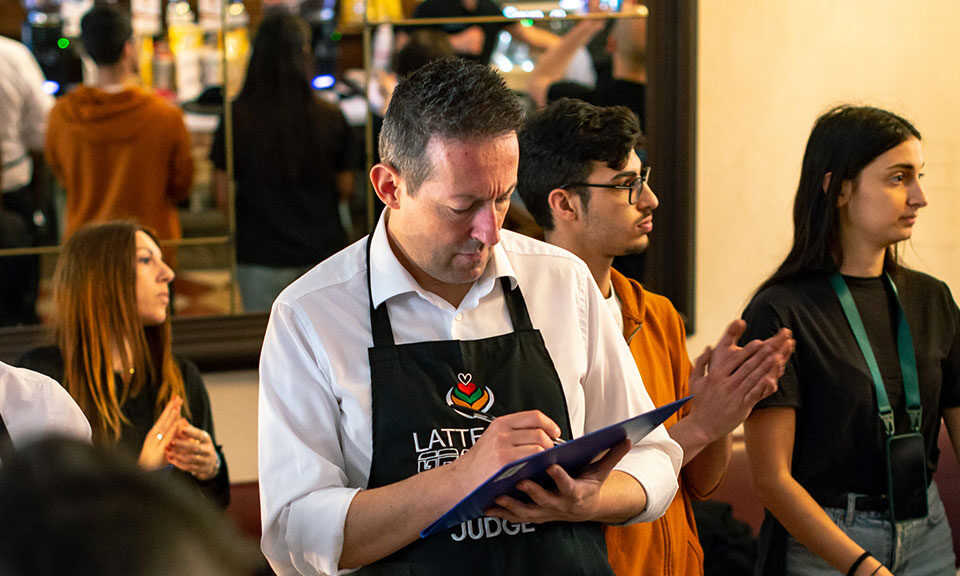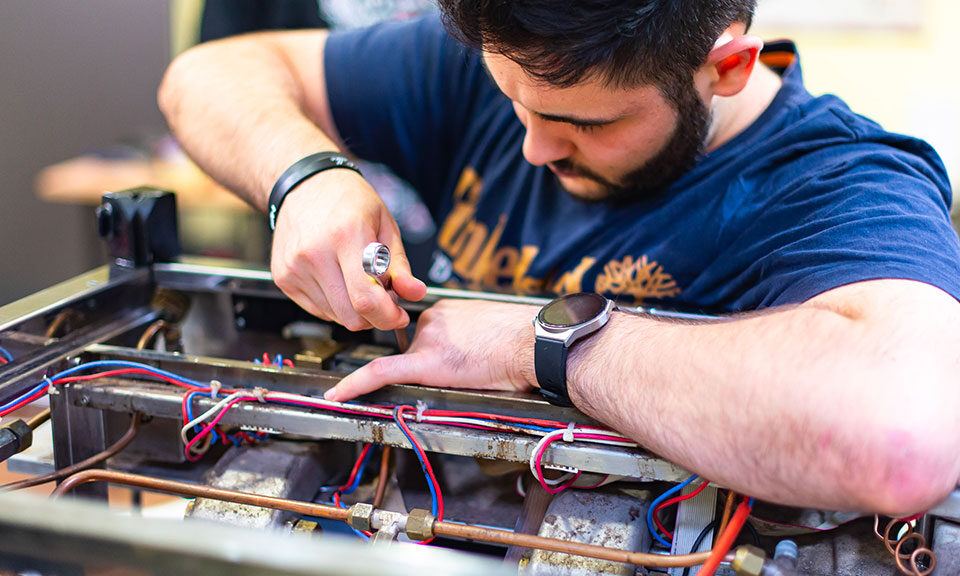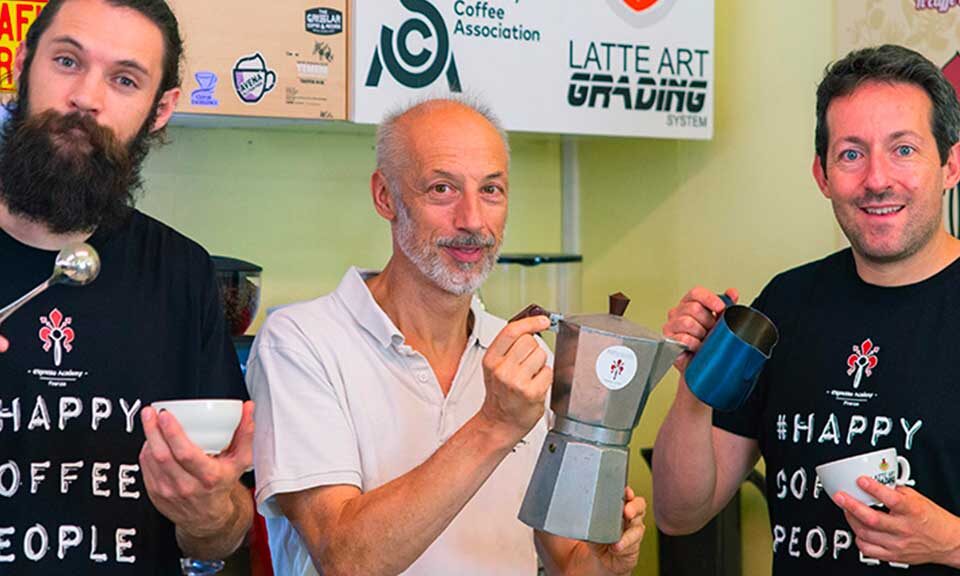
How latte art is graded in certifications and competitions?
19 November 2024Best Barista Courses in Nepal: Elevate Your Barista Skills


Nepal is known for its breathtaking landscapes, rich culture, and more recently, its growing coffee industry. While traditionally a tea-drinking country, Nepal has embraced coffee both as a producer and a consumer.
The mid-hill regions of Nepal provide the perfect altitude and climate for coffee cultivation, producing beans that are gaining international recognition. This rise in coffee production has also led to a flourishing coffee culture within the country, with more cafés and coffee shops opening in urban centers such as Kathmandu and Pokhara. Alongside this growth, there is an increasing demand for skilled baristas and coffee professionals.
Coffee Production in Nepal: A Rising Star in Specialty Coffee
The story of coffee in Nepal began relatively recently compared to other coffee-producing nations. Coffee plants were first introduced to the country in the early 20th century, but it wasn’t until the 1980s that coffee cultivation started gaining traction. Today, Nepal’s coffee production is primarily concentrated in the mid-hill regions, including areas like Gulmi, Lalitpur, Kavre, and Ilam. These regions, situated at altitudes between 800 and 1,600 meters above sea level, provide the ideal conditions for growing high-quality Arabica coffee.
One of the key factors contributing to the uniqueness of Nepali coffee is its organic and sustainable farming practices. Most of the coffee farms in Nepal are smallholder farms, where traditional farming methods are employed with minimal use of chemical fertilizers and pesticides. This focus on natural farming aligns with global trends toward more environmentally friendly and ethically sourced coffee.
Nepali coffee is known for its distinct flavor profile, often characterized by notes of chocolate, nuts, citrus, and floral undertones. The beans typically have a medium body with balanced acidity, making them highly sought after by specialty coffee roasters worldwide. As more Nepali farmers adopt improved processing methods, such as washed (wet) processing and natural (dry) processing, the quality of the coffee continues to improve, further enhancing its reputation on the global stage.
Nepal’s coffee production is still relatively small compared to major coffee-producing countries, but it is steadily growing. The government and various organizations are actively promoting coffee farming as a means of improving rural livelihoods. Coffee cooperatives and associations are working to support farmers by providing training, resources, and access to international markets.
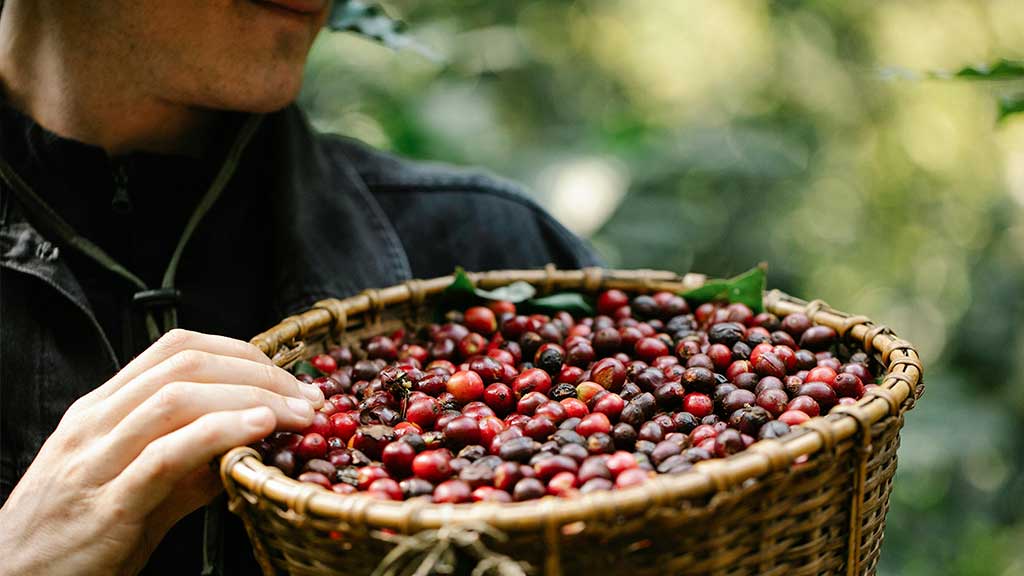
One significant milestone for Nepali coffee was the recognition of Nepal Coffee as a Geographical Indication (GI) product in 2017. This designation protects the identity of Nepali coffee, ensuring that only coffee grown and processed in Nepal can be labeled as such. It has helped to boost the country’s coffee industry by distinguishing Nepali coffee as a premium product on the global market.
The rise of specialty coffee consumption both in Nepal and abroad has also contributed to the growing demand for Nepali specialty coffee beans. Nepali coffee is now exported to countries such as Japan, South Korea, the United States, and various European nations, where it is appreciated for its unique flavors and ethical sourcing.
The local market is also experiencing a coffee boom. Cities like Kathmandu, Pokhara, and Lalitpur have seen a surge in specialty coffee shops catering to a more discerning customer base. These cafés often source their coffee directly from Nepali farmers, promoting the concept of “farm to cup” and fostering a deeper connection between producers and consumers.
This growing coffee culture has fueled the need for skilled baristas who can prepare high-quality coffee beverages and educate customers about the unique characteristics of Nepali coffee. As a result, barista training programs have become increasingly popular, providing aspiring coffee professionals with the knowledge and skills to thrive in this expanding industry.
In this post, we will explore the best coffee courses in Nepal, highlighting training programs that prepare aspiring baristas to excel in both local and international coffee markets.
The Growing Demand for Barista Training in Nepal
The coffee culture in Nepal is not just about consumption. Many young Nepali baristas have succeeded abroad, working in top coffee markets such as Australia, New Zealand, and the Gulf countries. Their skills, honed through training in Nepal, have made them highly sought after in these competitive job markets. As a result, more Nepali youths are seeking barista training as a pathway to build careers both locally and internationally.
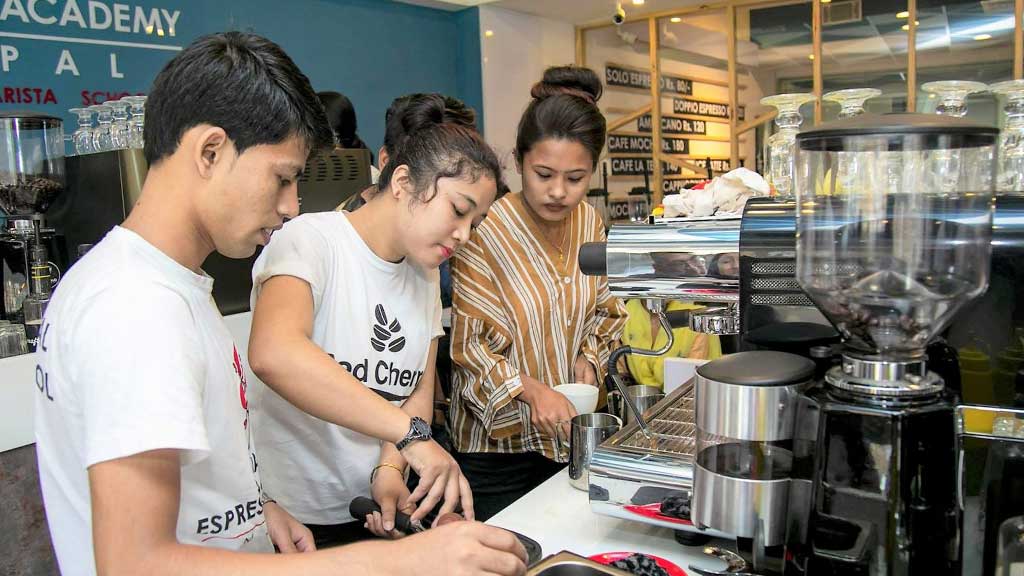
Nepali baristas have found career opportunities in various coffee markets around the world. In countries like Australia and New Zealand, where the café culture is deeply ingrained in society, there is a high demand for skilled baristas who can prepare specialty coffee drinks with precision. These countries are known for their rigorous coffee standards, and Nepali baristas, trained in professional courses back home, have excelled in meeting these expectations. In the Middle East, particularly in countries like the United Arab Emirates, Qatar, and Saudi Arabia, the coffee market is rapidly growing, with specialty coffee shops becoming increasingly popular. Nepali baristas are highly valued in these markets for their work ethic, adaptability, and ability to handle high-pressure environments.
Beyond these regions, Nepali baristas have also made their mark in European countries, where the specialty coffee scene continues to expand. Cities like London, Berlin, and Amsterdam are known for their vibrant coffee cultures, offering Nepali baristas opportunities to work in high-end coffee shops and even establish their own businesses. Furthermore, the demand for skilled baristas is growing in Asian countries such as Japan and South Korea, where coffee consumption has significantly increased in recent years. Nepali baristas are now recognized as a vital part of the global coffee industry, contributing to the spread of specialty coffee culture across continents.
Several barista schools have recently opened across the country to meet this demand. These institutions offer specialized courses to help individuals gain practical skills in coffee preparation, latte art, and espresso machine maintenance. Let’s look at some of Nepal’s best coffee training programs.
Top Coffee and Barista Training Schools in Nepal
1. Italian Espresso Academy Nepal
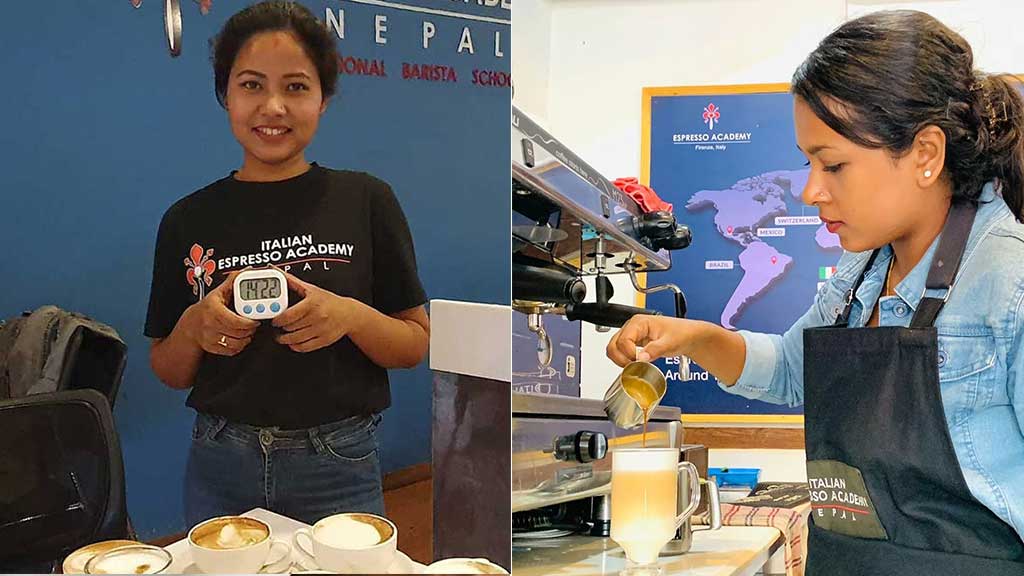
Located in Kathmandu, Italian Espresso Academy Nepal is a partner of the world-renowned Espresso Academy in Florence, Italy. It offers comprehensive barista training programs that lead to the prestigious Italian Barista Certificate (IBC). The academy’s trainers are certified by Italian coffee experts, ensuring that students receive high-quality education in coffee preparation, latte art, and coffee machine maintenance.
This school stands out for its focus on practical skills, preparing students to work in any coffee environment, whether it’s a specialty coffee shop in Nepal or a high-end café in Australia. The IBC certification is internationally recognized and adds significant value to a barista’s CV.
Espresso Academy has established a global network with 32 partner schools across the world, ensuring that its training standards are recognized and valued internationally. This network provides students with unparalleled opportunities to connect with coffee professionals and advance their careers globally.
Website: Italian Espresso Academy Nepal
2. Pearl International Coffee School
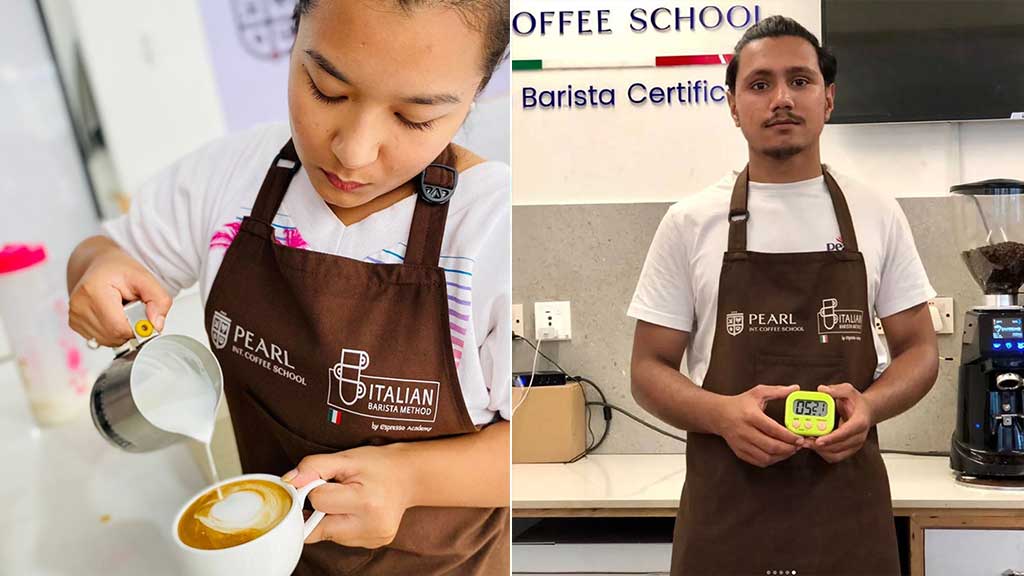
Another leading barista school in Kathmandu, Pearl International Coffee School is also affiliated with Espresso Academy in Florence. It offers a range of barista courses, including foundational and advanced training programs that cover espresso extraction, milk frothing techniques, and customer service skills.
What sets Pearl apart is its emphasis on hands-on training, giving students the confidence to work in real-world coffee environments. The trainers at Pearl have been trained by Italian coffee experts, ensuring a high standard of instruction.
Website: Pearl International Coffee School
3. Nepal Coffee Academy (NCA)
Located in Kathmandu, Nepal Coffee Academy offers a variety of coffee courses tailored to different skill levels. Their barista training programs include lessons on espresso preparation, milk steaming, and basic customer service. The academy also offers courses on coffee cupping and brewing methods.
These schools offer various course durations to suit different learning needs and schedules. Some programs focus on foundational skills for beginners, while others provide advanced training for experienced baristas seeking to refine their craft. Many schools also include practical, hands-on sessions to ensure students gain real-world experience before entering the workforce.
4. Himalayan Java Coffee School
Himalayan Java is one of Nepal’s most famous coffee brands, and they also operate a coffee training school. Their courses cover the basics of coffee making, including espresso extraction, milk texturing, and latte art. Students also have opportunities to intern at Himalayan Java Cafés across the country.
How Much Does Barista Training Cost in Nepal?
The cost of barista training in Nepal varies depending on the institution and the type of course. On average, barista courses in Nepal cost between NPR 10,000 and NPR 25,000 (approximately $75 to $190 USD) and you can contact all the coffee School available to check the differences in term of price and quality of the courses.
These fees usually cover training materials, equipment usage, and certification costs. Some schools also offer internships or job placement assistance as part of their programs.
How Long Is a Barista Course in Nepal?
Barista courses in Nepal typically range from two weeks to one month, with some schools offering flexible schedules to accommodate students’ availability. The length of the course can vary depending on the depth of the material covered and the level of practical experience provided. Prospective students should choose a course that aligns with their career goals and time commitments.
The Value of an Italian Barista Certificate (IBC) in Nepal
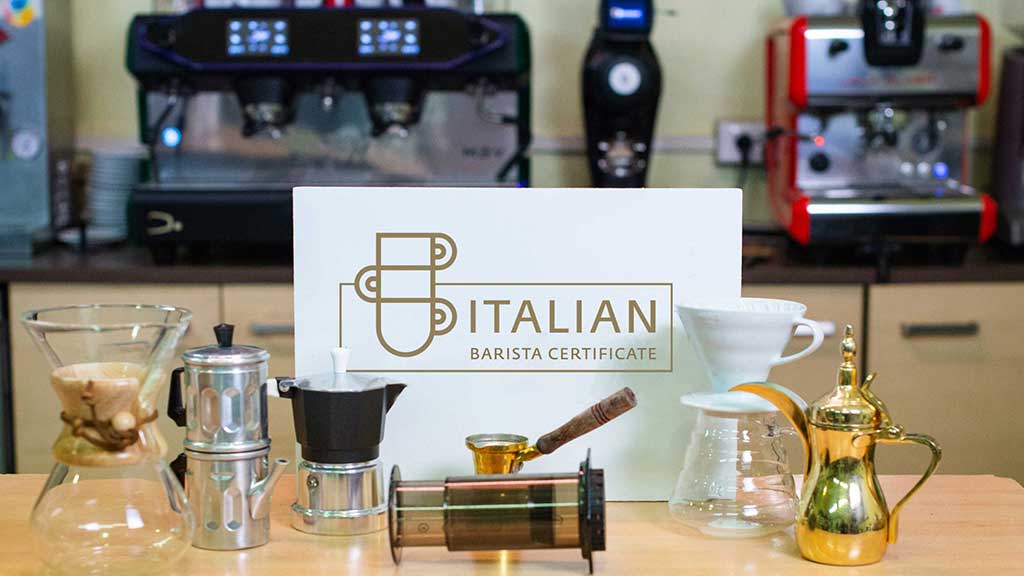
Obtaining an Italian Barista Certificate (IBC) is a game-changer for aspiring baristas in Nepal. This internationally recognized certification is a testament to a barista’s skills and knowledge in coffee preparation. It opens doors to job opportunities both locally and abroad, particularly in competitive markets like Australia, New Zealand, and the Gulf countries.
The IBC certification covers essential barista skills, including:
- Espresso extraction
- Milk texturing
- Latte art
- Coffee machine maintenance
- Customer service
Having an IBC certification on your CV not only boosts your employability but also gives you the confidence to work in any coffee environment.
Why Choose Espresso Academy for Barista Training?
Espresso Academy has been a leader in coffee education for years, offering some of the most comprehensive coffee training programs worldwide. Their partnerships with schools in Nepal, such as Italian Espresso Academy Nepal and Pearl International Coffee School, ensure that students in Nepal have access to world-class coffee education.
If you’re looking to start a career in coffee or elevate your existing skills, enrolling in one of these courses is a great way to achieve your goals. With the growing demand for skilled baristas, now is the perfect time to invest in barista training.
Success Stories: The Impact of Barista Training in Nepal
The success of barista training programs in Nepal is evident in the growing number of certified professionals who have entered the coffee industry. Over 2,450 students have been certified with the Italian Barista Certificate (IBC) in Nepal, and an impressive 85% of them have secured jobs in the coffee sector, both locally and internationally. The primary markets where these skilled baristas find employment include Australia, New Zealand, and the Gulf Area (United Arab Emirates, Qatar, Saudi Arabia, Kuwait, and Oman), reflecting the global demand for well-trained coffee professionals.
Additionally, Nepal has seen rising talent in the coffee competition scene. One remarkable achievement is the Barista Time Trial record set by Mira Rai in Kathmandu, completing the challenge in an impressive 8 minutes. Such events showcase the skill and dedication of Nepali baristas, further strengthening Nepal’s position in the global coffee community.
Conclusion
Nepal’s coffee culture is on the rise, and with it comes a growing demand for skilled baristas. Enrolling in one of the best coffee courses in Nepal can set you on a path to success, whether you plan to work locally or abroad. Schools like Italian Espresso Academy Nepal and Pearl International Coffee School offer internationally recognized certifications, such as the Italian Barista Certificate (IBC), which can open doors to exciting job opportunities around the world.
Investing in barista training is not just about learning how to make a good cup of coffee; it’s about building a career in a thriving global industry.


